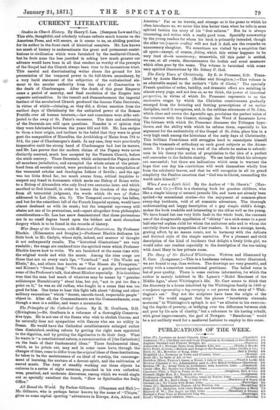an admirable sequel to the author's "Life of Christ." The
specially French qualities of order, lucidity, and dramatic effect are unfailing in almost every page, and not less so, as we think, the power of historical perspective, in virtue of which Dr. Pressensd represents to us the successive stages by which the Christian consciousness gradually emerged from the fettering and fretting prescriptions of an earlier discipline, until it recognizes, and, in the sublime utterances of St. John, which close and crown the Apostolic age, proclaims the perfect union of the creature with the Creator, through the Word of Incarnate Love.
The fairness with which Dr. Preasensd discusses the Tiibingen hypo- theses, and the ability with which he refutes them, especially in his argument for the authenticity of the Gospel of St. John, place him in a very high rank among the historians of the early days of Christianity. This brilliant Frenchman still struggles hard to emancipate himself from the trammels of orthodoxy on such great subjects as the Atone- ment. It is quite touching to read of the efforts he makes to subordi- nate in his theory the notion of propitiation to the idea of a perfect self-surrender to the Infinite charity. We can hardly think his attempts are successful ; but there are indications which seem to warrant the hope that one day his. convictions will work themselves wholly free from the scholastic leaven, and that he will recognize in all its grand simplicity the Pauline assertion that "God was in Christ, reconciling the world unto himself."






























 Previous page
Previous page